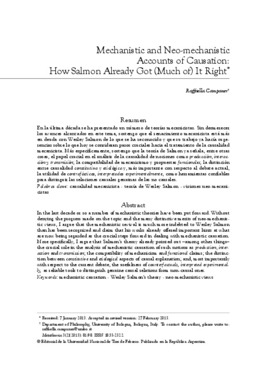Mostrar el registro sencillo del ítem
Mechanistic and neo-mechanistic accounts of causation : how Salmon already got (much of) it right
| dc.creator | Campaner, Raffaella | es |
| dc.date.accessioned | 2020-09-28T14:35:15Z | es |
| dc.date.available | 2020-09-28T14:35:15Z | es |
| dc.date.issued | 2013-04 | es |
| dc.identifier.citation | Campaner, R. (2013). Mechanistic and neo-mechanistic accounts of causation: how Salmon already got (much of) it right. Metatheoria, 3(2), 81-98. | es |
| dc.identifier.issn | 1853-2322 (impresa) | es |
| dc.identifier.issn | 1853-2330 (en línea) | es |
| dc.identifier.uri | http://ridaa.unq.edu.ar/handle/20.500.11807/2424 | es |
| dc.description | Fil: Campaner, Raffaella. Università di Bologna. Dipartimento di Filosofia e Comunicazione; Italia. | es |
| dc.description.abstract | In the last decade or so a number of mechanistic theories have been put forward. Without denying the progress made on the topic and the many distinctive merits of neo-mechanistic views, I argue that the mechanistic revival is much more indebted to Wesley Salmon than has been recognized and claim that his works already offered important hints at what are now being regarded as the crucial steps forward in dealing with mechanistic causation. More specifically, I argue that Salmon’s theory already pointed out –among other things– the crucial role in the analysis of mechanistic causation of such notions as production, interaction and transmission; the compatibility of mechanicism and functional claims; the distinction between constitutive and etiological aspects of causal explanation; and, most importantly with respect to the current debate, the usefulness of counterfactuals, interpreted experimentally, as reliable tools to distinguish genuine causal relations from non-causal ones. | en |
| dc.description.abstract | En la última década se ha presentado un número de teorías mecanicistas. Sin desmerecer los avances alcanzados en este tema, sostengo que el renacimiento mecanicista está más en deuda con Wesley Salmon de lo que se ha reconocido y que su trabajo ya hacía sugerencias sobre lo que hoy se consideran pasos cruciales hacia el tratamiento de la causalidad mecanicista. Más específicamente, sostengo que la teoría de Salmon ya señala, entre otras cosas, el papel crucial en el análisis de la causalidad de nociones como producción, interacción y transmisión; la compatibilidad de mecanicismo y propuestas funcionales; la distinción entre causalidad constitutiva y etiológica y, más importante con respecto al debate actual, la utilidad de contrafácticos, interpretados experimentalmente, como herramientas confiables para distinguir las relaciones causales genuinas de las no causales. | es |
| dc.format | application/pdf | es |
| dc.language | eng | es |
| dc.publisher | Universidad Nacional de Quilmes | es |
| dc.publisher | Universidad Nacional de Tres de Febrero | es |
| dc.rights | https://creativecommons.org/licenses/by-nc-nd/2.5/ar/ | es |
| dc.source | Metatheoria | es |
| dc.subject | Mecanicismo | es |
| dc.subject | Causalidad | es |
| dc.subject | Salmon, Wesley C., 1925-2001 | es |
| dc.subject | Historia de la ciencia | es |
| dc.subject | Mechanicism | en |
| dc.subject | Causality | en |
| dc.subject | History of science | en |
| dc.subject | Causalidade | pt |
| dc.subject | História da ciência | pt |
| dc.title | Mechanistic and neo-mechanistic accounts of causation : how Salmon already got (much of) it right | en |
| dc.type | info:ar-repo/semantics/artículo | es |
| unq.blm.ubicacion | P-AR-MET1 | es |
| unq.articulos.paginicio | 81 | es |
| unq.articulos.pagfinal | 98 | es |
| unq.revista.numero | 2 | es |
| unq.revista.volumen | 3 | es |
| unq.version | info:eu-repo/semantics/publishedVersion | en |
| unq.articulos.seccion | Artículos | es |
| unq.tipo.snrd | info:eu-repo/semantics/article | en |
| unq.acceso | info:eu-repo/semantics/openAccess | en |
Ficheros en el ítem
Este ítem aparece en la(s) siguiente(s) colección(ones)
-
Vol. 03, no. 02
Publicada en abril de 2013.

